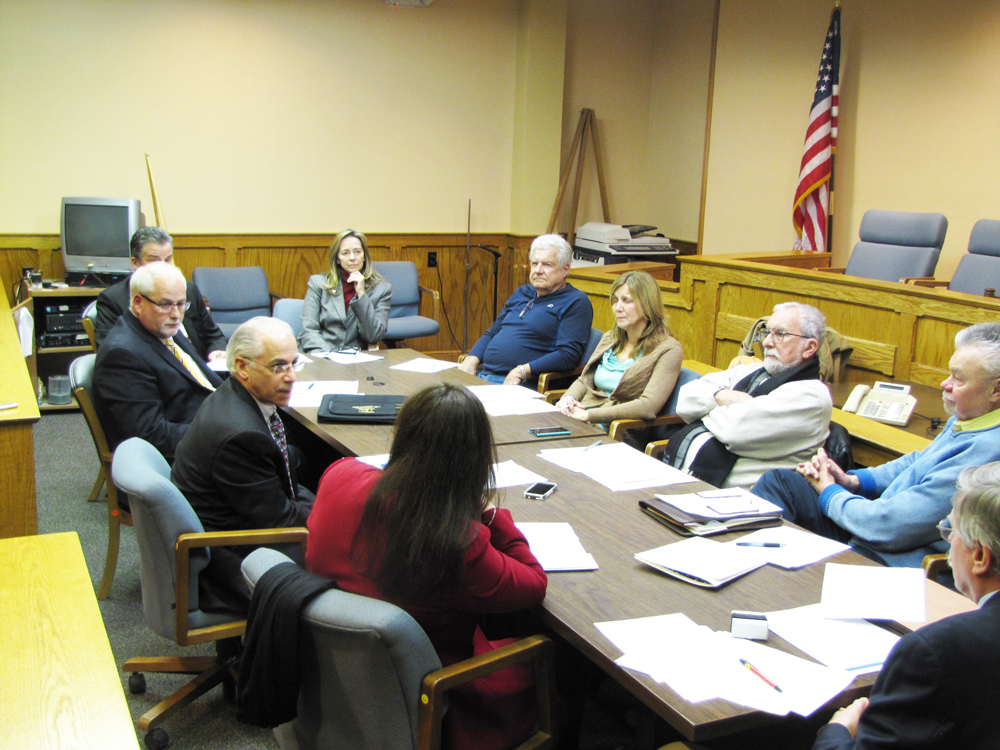Riverhead hospital gets $115K in IDA fees reduced to $35K

Locked in a dispute over the amount of fees Peconic Bay Medical Center should pay the Riverhead Industrial Development Agency due to a change in the hospital’s IDA financial assistance — a debate that amounted to a difference of $114,631 versus $2,500 — the two sides went behind closed doors Friday and emerged with a compromise that will end up with the hospital paying $35,000 in IDA fees.
The IDA, which grants tax incentives to lure new businesses to Riverhead Town, can also issue tax-exempt bonding for nonprofit agencies like hospitals. It funds its own budget by charging fees to the businesses it helps. How those fees are determined is spelled out in a schedule of fees available on the IDA website.
The fee for refinancing an IDA bond is a set $2,500 fee. For bonds, the IDA’s administrative fee varies on the amount of financial assistance.
In 2006 and 2007, Peconic Bay Medical Center issued $50 million in bonds for the expansion of its Route 58 hospital and paid the IDA a total of $200,000 in fees, Peconic Bay’s president and CEO, Andrew Mitchell, said in an interview.
“We could’ve gone to the Suffolk IDA, but we chose to keep the fees local,” he said. “We thought it was good citizenship and appropriate, that if the fees have to be paid, to support Riverhead.”
In 2012, Peconic Bay sought a bond modification to change banks from HSBC — which was getting out of the health financing business — to M&T Bank, Mr. Mitchell said.
Hospital officials went back to the IDA to document the change, and paid a $2,500 IDA refinancing fee.
“Then in 2014, we identified an opportunity with the current bank, M&T Bank, that if we add a bank mode to the bond structure, so the bank will hold the bond in their own portfolio — instead of having to sell it every day on the market — that the hospital could achieve a financing cost savings,” Mr. Mitchell said. The savings amounted to “a couple million dollars over 7 to 10 years,” he said.
But when hospital officials went back to the IDA board to document this change in their financial assistance packet, the IDA said it constituted a new project, and charged the hospital $114,631 in fees.
The IDA approved those fees in February, and hospital officials objected and met with IDA members in a special meeting Friday to try to change the fee amount, which Peconic Bay officials say exceeds their budget will put a financial strain on the hospital.
“They said it’s a refinancing and that they should only pay the fee for that,” IDA chairman Tom Cruso said at the start of Friday’s evening’s IDA meeting in Riverhead Town Hall. “We don’t believe that’s the case. We believe it’s new financing.”
Richard Ehlers, the IDA attorney, said the terms of the bond changed, and that for federal tax purposes, it’s a new issuance.
“It can’t be a new issuance,” Mr. Mitchell argued. “First of all, the IDA doesn’t have the authority anymore to issue new bonds, because that ability was sunset by the state Legislature in 2010.”
The state no longer allows IDAs to finance hospital bonds, and only allows the state Dormitory Authority to do so, Mr. Mitchell said.
“We operate on razor-thin profits,” Mr. Mitchell told the IDA Friday, adding that this is true of all hospitals. “The reason is simple. We give away to this community $8 million a year in uncompensated free care. Patients who come to this hospital are not turned away because they can’t afford to pay.”
The hospital has 1,200 employees and has a quarter-billion dollar economic impact on the area, Mr. Mitchell said.
Mr. Ehlers agreed that it’s a complicated transaction and said he respected the hospital’s view.
“I don’t see it as a new financial,” said Peconic Bay bond counsel Richard Dennett. “I don’t even see it as that close a call.”
Eventually, the two sides went into an executive session, not open to the public, and at times would have just two members from each side in the room at the same time, shuffling different people in and out of the room.
When the executive session ended after about 30 minutes, the two sides announced that they had agreed on a fee amount of $35,000, and the IDA passed a new resolution with that fee amount.
Asked afterwards if the IDA’s fee schedule allows for negotiation, Mr. Ehlers said it normally doesn’t, but in this case, it was unclear which category Peconic Bay Medical Center’s financial action fell under.
So, they compromised.








